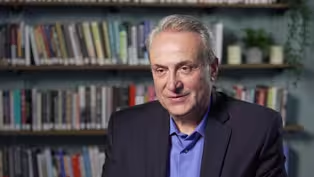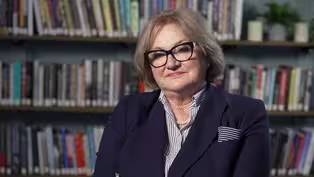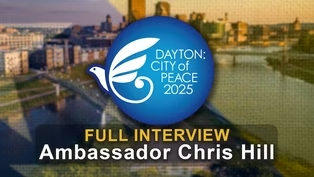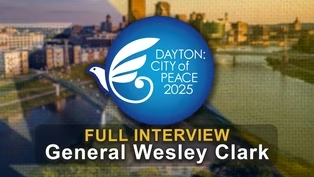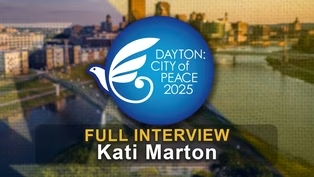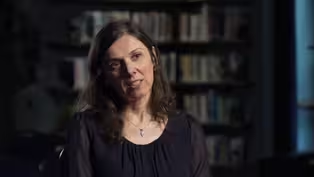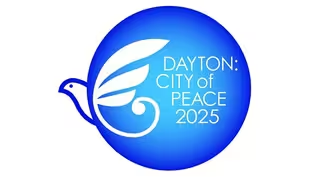
Dr. Alma Maric
Clip: Special | 5m 58sVideo has Closed Captions
Dr. Alma, a pediatrician born in Sarajevo, tells her story during the Bosnian War.
Dr. Alma, a pediatrician born in Sarajevo, lived through the Bosnian War, including the siege of Sarajevo and the tragic loss of her husband. Despite unimaginable hardship, she fled with her two children and rebuilt her life in Cincinnati, Ohio. This video tells her powerful story of survival, resilience, and healing across continents.
Problems playing video? | Closed Captioning Feedback
Problems playing video? | Closed Captioning Feedback
ThinkTV Originals is a local public television program presented by ThinkTV

Dr. Alma Maric
Clip: Special | 5m 58sVideo has Closed Captions
Dr. Alma, a pediatrician born in Sarajevo, lived through the Bosnian War, including the siege of Sarajevo and the tragic loss of her husband. Despite unimaginable hardship, she fled with her two children and rebuilt her life in Cincinnati, Ohio. This video tells her powerful story of survival, resilience, and healing across continents.
Problems playing video? | Closed Captioning Feedback
How to Watch ThinkTV Originals
ThinkTV Originals is available to stream on pbs.org and the free PBS App, available on iPhone, Apple TV, Android TV, Android smartphones, Amazon Fire TV, Amazon Fire Tablet, Roku, Samsung Smart TV, and Vizio.
Providing Support for PBS.org
Learn Moreabout PBS online sponsorship(gentle music) - I was a very young and ambitious student of medicine, who graduated from my medical school, 1981, and pursued a career of a physician and pediatrician at Children's Hospital in Sarajevo.
I finished my residency in pediatrics, and started my fellowship in pediatric gastroenterology.
Meanwhile, I also finished my Master thesis, which I defended right before the war started.
It was 1991.
So my ambitions were great, and I had a big dreams, big career, and medicine was my love, my, I perceived my future in medicine, and of course in building a family in Sarajevo.
I practiced medicine at Children's Hospital, big clinical center with secondary and some tertiary healthcare.
I was a young practicing physician, working, actually, I was at that time, just finished my residency in pediatrics.
There were days when I had to stay at home, because it was dangerous to go out.
There were days when the car was sent from the hospital with guarantees for the physicians to be safe, to be transported safely to the hospital.
It was very, very, very dangerous to move between the buildings, trying to find a shelter, to run the open areas to come to the hospital.
And that was my everyday work.
Because I had to be in the hospital.
The hospital that I initially worked in was burned.
Five babies were killed that night when the hospital was relentlessly bombed and shelled, in order to take the hospital.
The hospital, children's hospital, and maternity center were the same, practically the same facilities in the same, at the same location, next to each other.
That day, when the hospital was shelled, there were about 130 women in the hospital, about 70 babies.
It was not looking good.
In the building where I lived, we were sensing the tensions among people.
We were seeing looters around our building.
There were no supplies.
And suddenly, people started to disappear from the building.
My husband was still going to work, and he's still crossing the bridge at that time.
He told me to pick up my children.
It was a panic.
It was morning, and I took my children.
I dressed them and took some clothes for them, and my diplomas, my medical diplomas, and some of the money that we had in the apartment.
And we ran downstairs, and then we actually run to cross the bridge, to make it across the bridge, because few days later, that bridge was closed, and nobody could go back and forth.
People were not able to leave.
'Cause it was not easy to leave the country when the war started, the roads were blocked.
Sarajevo is in besiege, there were artillery every 35 meters and the 65 kilometers around Sarajevo.
I lost my husband.
He was killed as a civilian.
We arrived to Split, which is Croatia, which was way different world.
As we are approaching Split, we saw the hope.
This was the world, the world that didn't know or never experienced the war.
The markets were filled up with food, all goods.
When you see that and you suddenly realize, "I'm safe, and my children are safe," and I perceive that as victory.
Well, Dayton is a very interesting place.
This is a very diverse community.
This is a place where you really feel free.
This is the center of the Air Force Base.
I think this is the place that gives a very positive vibes and message to the world, and for that reason, I think it should take role in peace negotiations.
I think there is a hope, but again, requires a lot of work.
This is a different country now.
When you go back to Bosnia, it's rebuilt.
There are many, many interests for Bosnia, because it's attractive country with a lot of sources and wealth.
This is the country that has great potentials and great people.
(gentle music)
Video has Closed Captions
Clip: Special | 5m 54s | Adnan, born in Bosnia and Herzegovina, survived the Bosnian War, before moving to the US. (5m 54s)
Video has Closed Captions
Clip: Special | 6m 27s | Azra, a journalist from Sarajevo, started a successful culinary business in Dayton. (6m 27s)
Full Interview: Ambassador Christopher Hill
Video has Closed Captions
Clip: Special | 36m 58s | Amb. Christopher Hill interview, marking the 30th anniversary of Dayton Peace Accords. (36m 58s)
Full Interview: General Wesley Clark
Video has Closed Captions
Clip: Special | 33m 17s | Interview with retired Gen. Wesley Clark on ending the Bosnian War. (33m 17s)
Video has Closed Captions
Clip: Special | 40m 55s | Interview with Kati Marton, widow of Dayton Peace Accords negotiator Richard Holbrooke. (40m 55s)
Video has Closed Captions
Clip: Special | 5m 42s | Meet Irena, an educator whose journey began in Konjic, Bosnia and Herzegovina. (5m 42s)
Dayton: City of Peace 2025 Preview
Video has Closed Captions
Preview: Special | 30s | A new ThinkTV-produced honoring the 30th anniversary of the Dayton Peace Accords. (30s)
Providing Support for PBS.org
Learn Moreabout PBS online sponsorshipSupport for PBS provided by:
ThinkTV Originals is a local public television program presented by ThinkTV
